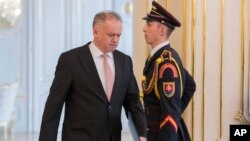Slovakia's President Andrej Kiska said on Tuesday he would not seek a second term in a presidential election in 2019 because of the "burden" posed by his involvement in political crisis which erupted after the murder of an investigative journalist.
Jan Kuciak had been covering high-level corruption when he and his fiancee were killed in February. Their deaths, as yet unsolved, raised public anger and led to Slovakia's biggest public protests since the fall of communism in 1989.
Kiska pressured long-serving prime minister Robert Fico and his cabinet to resign, earning him enemies among the supporters of Slovakia's ruling Smer party, which Fico still leads.
"I became involved in political conflicts that I saw as important in forming the spirit of our country... Some of my decisions left negative emotions in part of the society," Kiska told reporters on Tuesday.
"It will be better if people chose a president who will not carry the burden of conflicts I've been carrying," he said.
Slovaks have continued to hold regular protests at which thousands gather to call for a crackdown on corruption and Kiska has clashed with the new government formed by the same three-party coalition after Fico and his cabinet resigned.
In April he refused to appoint the government's first nomination for interior minister and reluctantly appointed the second candidate, calling it a "wasted opportunity to restore public trust" in light of alleged links between criminal networks and top politicians.
A former businessman and philanthropist with no prior political experience, Kiska has been a staunchly pro-western voice in Slovak politics and has often clashed with Fico's Smer, which has ruled the euro zone member state for most of the past decade.
As president, Kiska has less day-to-day executive power than the prime minister but the post carries political weight with the public. He is still the most trusted Slovak politician, followed by Prime Minister Pellegrini with 35 percent and Parliament Speaker Andrej Danko with 31 percent, according to a Focus agency poll released this month.
Kiska ruled out starting a new political party last year and said on Tuesday another reason for him not to seek re-election was that he wants to spend more time with his family.
But he may remain an active non-partisan figure, supporting liberal pro-western and pro-EU stance that has been very fragmented politically, political analyst from the Bratislava-based Institute for Public Affairs Grigorij Meseznikov said.
It is unclear who will run for the top job in Kiska's absence. None of the parliamentary parties have announced their presidential candidates so far.
On Tuesday, Kiska said he was considering other future roles in politics to leverage what he described as his still strong political support.
"I feel responsible to help start this change ... and help unite those who are not only willing but capable of ruling in a decent and responsible way," he said.
He did not give any details and said he would specify after regional elections in November.





